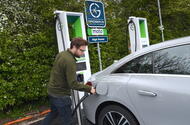Digital platform could cut charging costs by 50%, with prices capped at 40p per kWh
A “matchmaking” service enabling electric company cars to use the spare charging capacity of other operators has been launched by the Association of Fleet Professionals (AFP).
This move will plug gaps in the public networks while creating an additional source of income for owners, according to the AFP.
Electric vehicle registrations are heavily weighted to fleets in the UK, but charging can still be a challenge for businesses. The AFP has warned that expensive public networks can price fleets out of electrification, while issues installing depot and home charge points are stopping 65% and 49% of members respectively from deploying electric vans, according to member surveys.
However, members have also shown a willingness to cooperate, it says, with six in 10 van fleets prepared to make chargers available to other operators.
The service will launch as an online database, linking operators with available chargers on an informal basis. Any commercial arrangements will be ad hoc, but the AFP will offer advice if needed.
A dedicated digital platform will follow, introducing a more structured approach for fleets to register, search for and book charging sessions.
The concept is similar to Co-Charger, which enables home owners to earn money by sharing charge points with other drivers.
Committee members agreed a maximum price of 40p per kWh of energy, balancing attractive margins for charge point owners while keeping costs down for end users. That’s half the average price of DC rapid charging (80p per kWh) and almost a third less than slower AC units (56p per kWh), according to the latest Zapmap Price Index.
Development work on this approach will also addressing issues such as accessing private property, health and safety considerations and how to measure and pay for the energy used.
AFP chair Paul Hollick said: “If we can make the platform work, it should be quite a substantial boost for fleet EV charging.
“While it is not a universal solution – the provision of spare charging is probably not going to be evenly distributed across the country – it should provide a useful option for fleets beyond home charging, their own workplace charging, and pay-on-use public chargers.”







